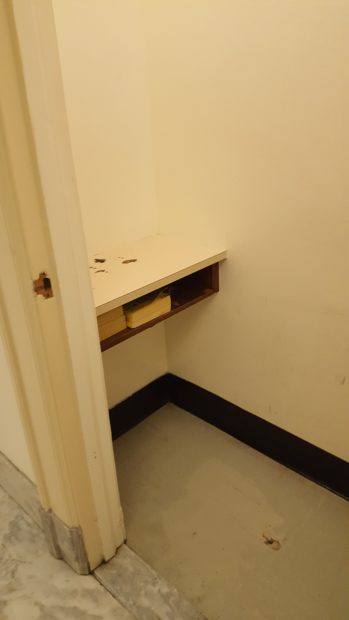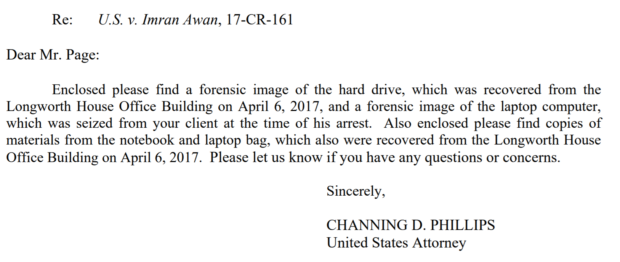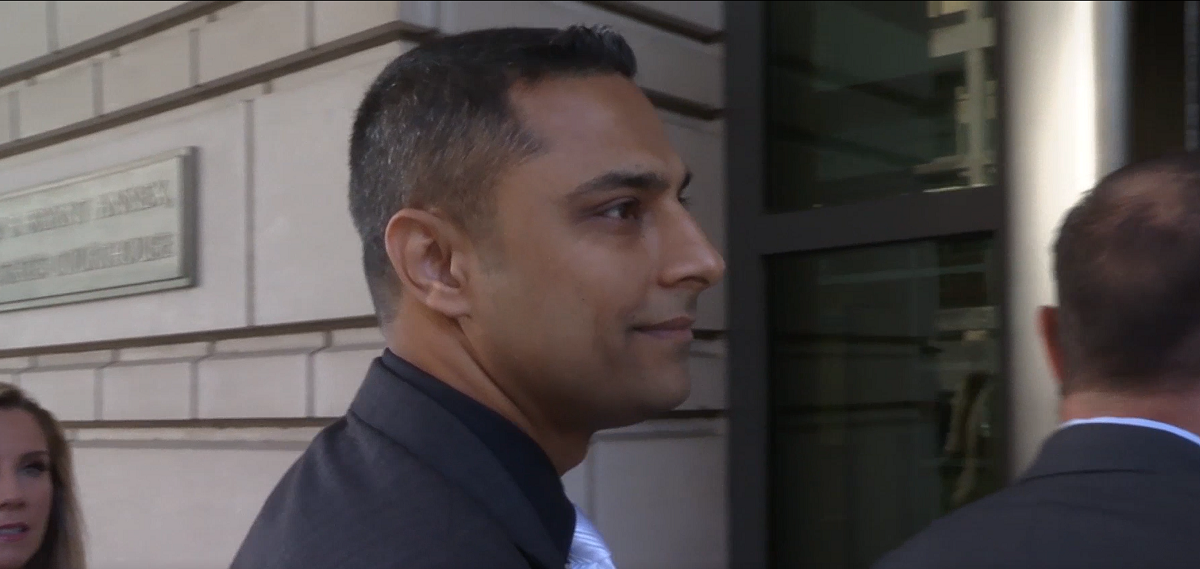A key, if under-covered, aspect of the “Pakistani mystery man” story is that Imran Awan, the Pakistani-born IT aide of former DNC head Debbie Wasserman Schultz, took a laptop with username RepDWS after he was banned from the House computer network for “unauthorized access to data,” and then left it in a phone booth with a letter to prosecutors.
On Friday, President Donald Trump tweeted: “Just heard the Campaign was sued by the Obstructionist Democrats. This can be good news in that we will now counter for the DNC Server that they refused to give to the FBI, the Debbie Wasserman Schultz Servers and Documents held by the Pakistani mystery man and Clinton Emails.”
Trump appears to have accurately identified a key issue with the “Pakistani mystery man” that comes straight from court documents.
- Lawyers for Pakistani-born Imran Awan currently have a copy of the contents of a laptop with the username RepDWS
- Wasserman Schultz wanted to block prosecutors from seeing what was on it
- Imran’s lawyers have attempted to set up a situation where it is up to Imran whether prosecutors can see the laptop, claiming “attorney client privilege”
- Other analysts say the laptop should be fair game for review
Each twist has increased the intrigue:
- On Feb. 2, 2017, Imran was banned from the House computer network for making “unauthorized access” to congressional data, according to the House inspector general
- This happened not long after Wasserman Schultz was fired from the DNC after a cyber breach, yet she refused to fire Imran or even put him on paid leave, claiming that an IT aide didn’t need to access the internet to do his job
- Wasserman Schultz’s refusal to fire him meant he had continued physical access to the congressional office buildings, even though all of his other part-time employers fired him and he knew there was an ongoing criminal investigation
- On April 5, 2017, despite not being allowed to connect to the House network, he was in possession of a laptop with the username RepDWS and left it in a phone booth, where it was picked up by police who confiscated it because they recognized that it was left there by a criminal suspect
Let that sink in. A Pakistani IT aide, who had just been fired by all his other employers for being a suspected hacker, left a laptop with the username RepDWS in a phone booth. The laptop was placed next to a letter to prosecutors. What it said is not publicly known. The cache of documents also included copies of Awan’s ID (which assured that police tied the laptop to a criminal suspect and seized it as evidence rather than returning it as lost property) and a note that said “attorney client privilege,” which put the laptop into legal limbo.

Wasserman Schultz’s laptop was left in an old phone booth in the Rayburn building like this one. / Photo: DCNF
It is not clear whether the laptop was left out of carelessness or was potentially stolen and possibly planted for police to find.
- It was left in the booth (photo to the right) with highly specific and sensitive materials
- It may have been left there late at night. Building staff called police at 12:21 a.m. to report “an unattended bag in the phone booth on the 2nd floor.” Imran’s attorney said in court that it was snatched by police while he had stepped out of the phone booth to search for better reception: “What occurred is a backpack from my client was found, he was trying to get a better signal, there was a note that said attorney client privilege and a hard drive.” Gowen later offered TheDCNF a seemingly conflicting account, saying in an email: “He wasn’t there late at night that is just false.”
- The phone booth is in the Rayburn House Office Building. Wasserman Schultz’s office is in Longworth, a different building.
What happened next adds to the mystery. On May 17, 2017, Wasserman Schultz used a hearing on the Capitol Police’s budget to threaten Police Chief Matthew R. Verderosa with “consequences” if he didn’t return what she characterized as “a member’s equipment.” She repeatedly asked whether it was a member or a staffer who was under investigation, saying since it was a member’s equipment, police shouldn’t be able to take it unless the member was under investigation. A member of the Committee on Appropriations’ Legislative Branch Subcommittee, she has significant influence over the Capitol Police’s budget.
WATCH:
When that didn’t work, she escalated, raising the prospect of re-arranging the Capitol Police’s entire board to prevent Verderosa from being a voting member, and lamented that not all of the board’s members were subject to oversight by her committee. Questioning Verderosa’s boss, Sergeant-at-Arms Paul Irving, she said: “We have had jurisdictional issues and a challenging time conducting oversight because of the structure of the Capitol Police Board and there — there being a (inaudible) line rather than a direct line to us in terms of being able to hold the board accountable.”
“I’d like to know, sergeant, if you think that we should be looking at restructuring the way the board makes decisions so that we can establish a more direct line of accountability … At the end of the day, [the chief] doesn’t have a decision-making role,” Wasserman Shultz continued.
She also used campaign funds to hire a lawyer to keep the laptop out of prosecutors’ hands. And it wasn’t just any lawyer — it was Bill Pittard, who until months prior had been working as acting general counsel of the House of Representatives, a position with responsibilities that include deciding what to turn over to the executive branch pursuant to legal activity.
In August, after Imran’s arrest at Dulles airport, Wasserman Schultz changed her tune, saying “This was not my laptop. I have never seen that laptop. I don’t know what’s on the laptop.” She said it was Imran’s laptop but purchased using taxpayer funds from her office.
She said Imran’s “due process” rights had inspired her demeanor during the Capitol Police exchange and the lengths to which she went to shield the laptop. She then said she was no longer seeking to block prosecutors from looking at the laptop.
But by then, Imran had taken up the same quest. In September, prosecutors turned over a copy of the government laptop to Imran, even though he had been banned from the House network because he was viewed as a threat. In October, Imran’s attorney, Chris Gowen — a former aide to Hillary Clinton — said in court that Imran was invoking attorney-client privilege on the laptop and that they “feel very strongly” that the hard drive not be able to be used as evidence.

Prosecutors gave Imran a copy of the laptop found in a phone booth / Federal court records
That seemed to set up a situation where Imran was shielding the laptop that Wasserman Schultz had initially not wanted examined, but where it would be within his power to drop the objection. That’s significant because House sources have said that Democrats aren’t cooperating with the Awans’ prosecution, and raised questions about whether he has leverage over them.
Former U.S. Attorney Andrew McCarthy questioned that attorney-client privilege applies to the laptop at all, saying, “If I give my lawyer my bank records and ask him if they show evidence of a crime, the bank records do not become [attorney-client] privileged — only his advice to me would be [attorney-client] privileged. And if I stuck a sign on my bank records that said ‘[attorney-client] privileged documents,’ that would not make them [attorney-client] privileged documents.”
Wasserman Schultz has declined to answer questions about the laptop, but given that it was government equipment that, as she noted previously, belongs to her, she might be able to explicitly give permission to prosecutors to look at it. In particular, if Imran wasn’t authorized to have the laptop, it could be more difficult to invoke privilege on it. (Wasserman Schultz’s brother is an assistant U.S. attorney at the same office that is handling the case, and he has tweeted dismissively about it.)
Rather than simply swatting down the claim and using what McCarthy said is the universally employed solution to such a dilemma — using a “taint team” to go through the laptop and isolate specific files that are communications to Imran’s lawyer — prosecutors have delayed the court hearing five times, telling the judge repeatedly: “The government has been in discussions with counsel for the defendants regarding complex discovery issues and other legal issues in this case, in particular issues surrounding claims of attorney-client privilege being raised by defendant Imran Awan,” court papers filed Tuesday say.
The next court date is set for May 4, though could be postponed a sixth time.
